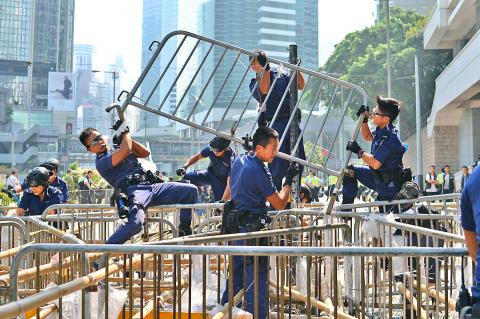Hong Kong police yesterday vowed to tear down more street barricades manned by pro-democracy protesters, hours after hundreds of officers armed with chainsaws and boltcutters partially cleared two major roads occupied for two weeks.
In a concerted effort to reduce the territory held by protesters, police tore down barricades in the bustling shopping district of Causeway Bay and on the edge of the main protest encampment in Admiralty, near the city government’s headquarters. They also vowed to target protester cordons in Mongkok, a working-class district known for its triad gangs, where violence has previously broken out.
Huge crowds have intermittently rallied against China’s insistence that it will vet candidates standing for election as the semi-autonomous city’s next leader in 2017 — a move protesters have labeled “fake democracy.”

Photo: AFP
While the activists have been praised for their civility and organizational skills, they have also brought widespread disruption to an already densely populated city. Angry and sometimes violent scuffles have broken out between demonstrators and government loyalists, sparking accusations the authorities are using hired thugs to sow trouble.
Police had been keeping a low profile at the three main protest sites after a decision to fire tear gas at peaceful demonstrators on Sept. 28 caused outrage and encouraged tens of thousands to take to the streets.
However, in the past two days, officers have begun probing protester defences in raids aimed at opening some roads to traffic, while allowing the bulk of demonstrators to stay in place. About 150 police dismantled metal barricades at the Causeway Bay site before dawn yesterday, freeing up traffic in one direction, but leaving the protest camp there largely intact.
Hours later, another contingent of officers tackled barricades at the main Admiralty site, using chainsaws to slice through bamboo poles and freeing up one of the multi-lane highways in the district.
At both sites protesters put up little resistance, sticking to their promise of non-violence.
Some protesters were seen sobbing as police went to work dismantling the barricades.
“We are only residents and students,” one tearful young woman shouted at police. “We will leave, as we are unable to fight you, but we will not give up.”
Police insisted they would soon turn their attention to Mongkok.
A similar clearance operation on Monday at the edges of the Admiralty protest camp prompted activists there to swiftly regroup.
They laid down cement foundations and built up bamboo pole barricades blocking both lanes of a highway, using everything from steel chains to plastic cable ties and sticky tape to strengthen them — even enlisting sympathetic construction workers for help.
However, police yesterday cleared them in less than an hour.

MAKING WAVES: China’s maritime militia could become a nontraditional threat in war, clogging up shipping lanes to prevent US or Japanese intervention, a report said About 1,900 Chinese ships flying flags of convenience and fishing vessels that participated in China’s military exercises around Taiwan last month and in January have been listed for monitoring, Coast Guard Administration (CGA) Deputy Director-General Hsieh Ching-chin (謝慶欽) said yesterday. Following amendments to the Commercial Port Act (商港法) and the Law of Ships (船舶法) last month, the CGA can designate possible berthing areas or deny ports of call for vessels suspected of loitering around areas where undersea cables can be accessed, Oceans Affairs Council Minister Kuan Bi-ling (管碧玲) said. The list of suspected ships, originally 300, had risen to about 1,900 as

Right-wing political scientist Laura Fernandez on Sunday won Costa Rica’s presidential election by a landslide, after promising to crack down on rising violence linked to the cocaine trade. Fernandez’s nearest rival, economist Alvaro Ramos, conceded defeat as results showed the ruling party far exceeding the threshold of 40 percent needed to avoid a runoff. With 94 percent of polling stations counted, the political heir of outgoing Costa Rican President Rodrigo Chaves had captured 48.3 percent of the vote compared with Ramos’ 33.4 percent, the Supreme Electoral Tribunal said. As soon as the first results were announced, members of Fernandez’s Sovereign People’s Party

MORE RESPONSIBILITY: Draftees would be expected to fight alongside professional soldiers, likely requiring the transformation of some training brigades into combat units The armed forces are to start incorporating new conscripts into combined arms brigades this year to enhance combat readiness, the Executive Yuan’s latest policy report said. The new policy would affect Taiwanese men entering the military for their compulsory service, which was extended to one year under reforms by then-president Tsai Ing-wen (蔡英文) in 2022. The conscripts would be trained to operate machine guns, uncrewed aerial vehicles, anti-tank guided missile launchers and Stinger air defense systems, the report said, adding that the basic training would be lengthened to eight weeks. After basic training, conscripts would be sorted into infantry battalions that would take

GROWING AMBITIONS: The scale and tempo of the operations show that the Strait has become the core theater for China to expand its security interests, the report said Chinese military aircraft incursions around Taiwan have surged nearly 15-fold over the past five years, according to a report released yesterday by the Democratic Progressive Party’s (DPP) Department of China Affairs. Sorties in the Taiwan Strait were previously irregular, totaling 380 in 2020, but have since evolved into routine operations, the report showed. “This demonstrates that the Taiwan Strait has become both the starting point and testing ground for Beijing’s expansionist ambitions,” it said. Driven by military expansionism, China is systematically pursuing actions aimed at altering the regional “status quo,” the department said, adding that Taiwan represents the most critical link in China’s